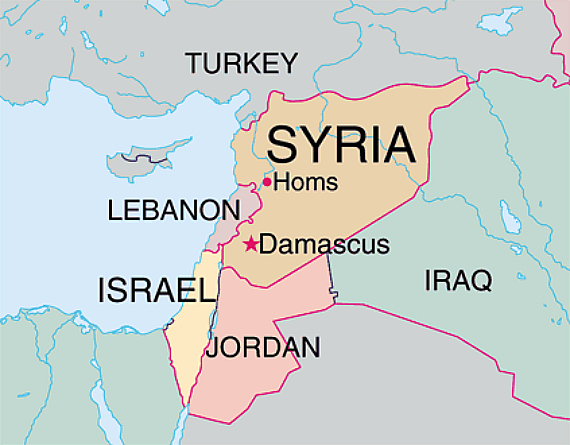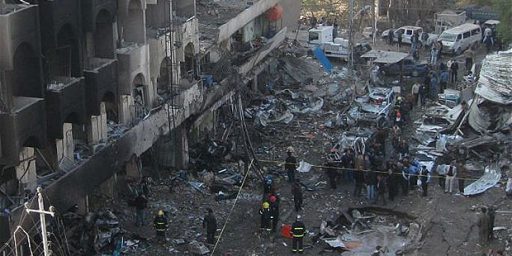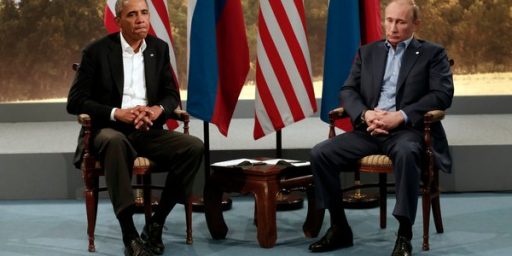Syria’s Civil War Inspiring Sectarian Violence Outside Syria
Syria's violence is slipping across it's borders.That's not good news at all.
The New York Times takes note today of the fact that the Syrian Civil War seems to be causing sectarian violence between Sunni and Shiite Muslims to flare up in other parts of the Middle East:
BAGHDAD — Renewed sectarian killing has brought the highest death toll in Iraq in five years. Young Iraqi scholars at a Shiite Muslim seminary volunteer to fight Sunnis in Syria. Far to the west, in Lebanon, clashes have worsened between opposing sects in the northern city of Tripoli.
In Syria itself, “Shiites have become a main target,” said Malek, an opposition activist who did not want his last name published because of safety concerns. He was visiting Lebanon from a rebel-held Syrian town, Qusayr, where his brother died Tuesday battling Shiite guerrillas from the Lebanese militia Hezbollah. “People lost brothers, sons, and they’re angry,” he said.
The Syrian civil war is setting off a contagious sectarian conflict beyond the country’s borders, reigniting long-simmering tensions between Sunnis and Shiites, and, experts fear, shaking the foundations of countries cobbled together after the collapse of the Ottoman Empire.
For months, the fighting in Syria has spilled across its borders as rockets landed in neighboring countries or skirmishes crossed into their territories. But now, the Syrian war, with more than 80,000 dead, is inciting Sunnis and Shiites in other countries to attack one another.
“Nothing has helped make the Sunni-Shia narrative stick on a popular level more than the images of Assad — with Iranian help — butchering Sunnis in Syria,” said Trita Parsi, a regional analyst and president of the National Iranian American Council, referring to President Bashar al-Assad of Syria. “Iran and Assad may win the military battle, but only at the expense of cementing decades of ethnic discord.”
The Syrian uprising began as peaceful protests against Mr. Assad and transformed over two years into a bloody battle of attrition. But the killing is no longer just about supporting or opposing the government, or even about Syria. Some Shiites are pouring into Syria out of a sense of religious duty. In Iraq, random attacks on Sunni mosques and neighborhoods that had subsided in recent years have resumed — a wedding was recently hit — as Sunni militias fight the army.
With Sunni-led Saudi Arabia, Qatar and Turkey backing the uprising against Mr. Assad, who is supported by Shiite Iran and Hezbollah, sectarian divisions simmering since the American invasion of Iraq are spreading through a region already upended by the Arab uprisings.
The Syrian war fuels, and is fueled by, broader antagonisms that are primarily rooted not in sect but in clashing geopolitical and strategic interests: the regional power struggle between Saudi Arabia and Iran; Iran’s confrontation with the West over its nuclear program; and the alliance between Hezbollah and the secular Syrian government of Mr. Assad against American-backed Israel.
But sectarian feeling has seeped in. Iraq has been especially vulnerable. With the Sunni majority in Syria battling to overthrow a government dominated by Mr. Assad’s Alawite sect, an offshoot of Shiism, some in Iraq’s Sunni minority grew emboldened by the prospect of overthrowing their own Shiite government.
Today, many Iraqis feel they are on the road back to the dark days of 2006 and ’07, the peak of sectarian militia massacres by Shiites ascendant after years of oppression under Saddam Hussein, and by minority Sunnis disempowered by his fall.
While the 2007 American troop surge helped to limit the bloodshed, random attacks against Shiites never stopped. What was different was that the Shiites, who finally felt firmly in control of the security forces, stopped retaliating. But that seems to be changing.
Sunni militias have risen up to fight the army, and for the first time in years Sunni mosques and neighborhoods are being regularly targeted. The first notable attack was in April, at a cafe in the Sunni neighborhood of Amariya; it started late at night as young men played pool, and it left dozens of people dead. While it is unclear who is responsible for the new violence, many Sunnis blame the government, or Iranian-backed Shiite militias.
In Lebanon, perennial clashes between Alawite and Sunni militias in Tripoli have reached their worst level in years as each side blames the other for carnage in Syria.
The danger that the war in Syria could spread across the border has been a concern virtually since it started. We’ve already had several cross-border incidents at the Turkish border, including one that briefly inflamed tension between the Turks and the Syrian government after a Turkish plane was shot down. Now, though, it seems to look as though the war in Syria is influencing violence beyond Syria’s borders. The recent uptick in violence in Iraq, for example, may well be influenced by the Sunni-Shiite fighting going on right next door. Perhaps of more concern, though, is the fact that a known terrorist group is getting in on the action:
Lebanese Hezbollah militants have massed in and around the northern Syrian city of Aleppo, a senior commander in the Lebanese Shiite movement said Sunday, broadening the group’s backing of President Bashar al-Assad’s forces and stoking fears of an imminent assault on the city.
The commander, who declined to be named because he is not authorized to speak to the media, said there were about 2,000 Hezbollah fighters in Aleppo province, largely stationed in Shiite towns north of the city. Rebels said Hezbollah forces had entered the city itself Sunday and were preparing for an attack.
Rebels have secured swaths of Aleppo — Syria’s commercial capital and most populous city — since fighting engulfed the city last summer, but the front lines have been locked in a stalemate. An assault on the city could stretch rebel forces, which have sent reinforcements from Aleppo to fight against Hezbollah and Syrian army troops in the battle for the town of Qusair, near the Lebanese border.
The presence of Hezbollah’s guerrilla fighters in Syria’s north point to its widening support for the government in the wake of its leader Hasan Nasrallah’s pledge to back Assad until the end. Previously, the Hezbollah fighters largely had been concentrated in Qusair and the Damascus suburbs, where they are guarding the Shiite shrine of Sayyida Zaynab.
“The Aleppo battle has started on a very small scale, we’ve only just entered the game,” said the commander, who was on leave from fighting in Qusair, where he oversees five units. “We are going to go after strongholds where they think they are safe. They are going to fall like dominos.”
He said that the militants were largely concentrated the Shiite towns of Zahra and Nubol, which have been under siege from largely Sunni rebel forces. A spokesman for Hezbollah said he could not confirm or deny their presence.
Louay al-Mokdad, political and media coordinator for the Free Syrian Army, said Hezbollah militants had gathered at a military academy in Aleppo’s western district of Hamdaniya on Sunday. He put the number of the Shiite movement’s soldiers in the area at 4,000, citing rebel intelligence.
There also reports of elements of Hezbollah and elements of the Free Syrian Army exchanging fire inside Lebanon itself.
Reports that Hezbollah is getting involved in the war, and that the war itself is spreading into Lebanon are particularly concerning. Hezbollah’s military arm is at least as powerful as the Free Syrian Army, and likely more powerful and much better armed. That force fighting alongside the pro-Assad forces in Syria would give a significant boost the regime and make it far more difficult for Syrian rebels to pull off the kinds of victory they need to either push Assad to the negotiating table or force him out of power. Indeed, over the past several months, there appears to have been a decided shift in the tide of the war back in favor of the regime, which is actually the direction the war has been moving for two years now notwithstanding the advances we’d been seeing from the rebels at the beginning of the year. Just as worrisome is the prospect of the war spreading into Lebanon and reigniting the sectarian fighting that had gripped that country for decades, including the period during which the nation was effectively under de facto control from Damascus. The more Lebanon becomes a second battlefield in the Syrian war, the more likely it is that those passions will be reignited, only this time Hezbollah will be a far stronger player than it was in the past while the Lebanese Christians and Druze will be far weaker. That development alone is likely to be of great concern to Israel, which fought a war against Hezbollah less than a decade ago. The prospect of a civil reigniting on their Northern border to compete with the one just on the other side of the Golon Heights is likely of great concern to Israel, and may end up provoking them to take pre-emptive action that would turn a civil war into a wider regional war. Add the Palestinians into the mix, and the future of that area of the Middle East becomes a lot more murky.
Reports like this are yet another reason why it would be a tremendous mistake for the United States, or indeed any part of the West, to get heavily involved in the war in Syria. Slowly but surely, that war has morphed from the war between the Assad regime and the rebels seeking to overthrow it that was inspired by the Arab Spring movement into what looks for all the world like a sectarian conflict involving Sunni, Shiites, Alawaites, and the other ethnic groups that make up Syria. Now, it appears that the war is spreading outside of Syrian in the form of sectarian violence. Placing ourselves in the middle of this type of conflict would be a tremendous mistake and would likely make us (and by us I mean both the U.S. and the West in general) targets for both sides of the conflict when they inevitably start to interpret our involvement as being in favor of the other side regardless of whether or not we profess our neutrality. It is, in other words, a complete no-win situation.
It’s hard to say where things are headed in the Middle East now. Perhaps these explosions of sectarian violence in Iraq and Lebanon will quiet down at some point, in which case the fears of a wider war could be set aside. The worst case scenario, obviously, would be for the violence to spread, perhaps into Jordan, which has managed to avoid both the violence to date and many of the more violent aspects of the Arab Spring. In either case, it seems clear that there’s unlikely to be a quick end to the war in Syria and that things are likely to become more murky and dangerous as time goes on. Sounds to me like a good reason to keep as far away as possible.







The problem with Doug’s analysis is that he seems to think that if we stay out of the Syrian civil war, America and the west can somehow not become targets and American interests not implicated. Surely, that ship has sailed.Its one thing if the civil war remained limited and if other foreign powers weren’t being drawn in. But since last year, the level of violence has only grown and more and more foreign powers have been drawn in. Heck Israel has already directly intervened. As far as Middle Easterners are concerned, Israel’s intervention IS America’s intervention.
What all this mean is that US intervention is most likely inevitable at some point. What remains is when and how. That’s what we should be thinking about.
@stonetools:
You make points that I can agree with. But, what exactly are we supposed to do? This conflict is approaching a point where the only thing that might be able to stop it is to place a military force in between the two warring sides, at which point it becomes a target for both.
Given the fact that we know for a fact that the Syrian rebels are now strongly influenced by al Qaeda and that the Assad government is getting direct aid from Iran and Hezbollah, there are no good sides in this war. Perhaps the best option is to say that we won’t allow the war to spread. Because, if violence starts cropping up in some place like Jordan then the world will have a real problem on its hands and the possibility of regional war would seem to become more likely. Finally, it’s entirely possible that we’d end up doing more damage by intervening than by staying on the sidelines. There are plenty of example from our recent history to establish that this would not be unexpected.
Agree with you here. But that may be an argument for SMART intervention, if intervention is inevitable, as seems likely.I agree with you that it would be great, if we could sit this one out. But just because a situation is complex and fraught with peril doesn’t mean that we can avoid involvement.
I agree that if we get involved it should be very carefully and as a last resort. But we certainly should be thinking about when, how, and what the best outcome for the USA should be. Standing pat and hoping things don’t get worse isn’t really a good strategy in the Middle East.
Let me understand this. We have a civil war which is also a religious and ethnic war, with Hezbollah on one side, Al Qaeda and affiliates on the other, in a region where hopes for anything like decent government seem misplaced, and we should get involved in this?
I don’t see our dog in this fight.
@michael reynolds: Good God, I’m agreeing with michael. I must be drunker than I thought. Or he is.
@stonetools: Agree with you here. But that may be an argument for SMART intervention, if intervention is inevitable, as seems likely.I agree with you that it would be great, if we could sit this one out. But just because a situation is complex and fraught with peril doesn’t mean that we can avoid involvement.
OK, genius, just what counts as “SMART” intervention? Here, let me toss out a few of what I suspect are your stock, meaningless answers:
–Intervention that brings about a moderate government. (Ex post facto, defined by result)
–The sort of thing Bush would never even consider (empty, pointless insult)
–Encouraging and supporting the moderates against the radicals (tried — and failed — in Egypt and Libya, where the radicals simply lied until they got power)
–Imposing a “no-fly zone” over Syria (very little of the fighting is in the air, and the Syrians have anti-air defenses)
God help me, I’m with michael here. The only thing we should even think of considering is closing off the borders of Syria, allowing no weapons in or out. Let the Syrians (and the non-Syrians already there) settle it themselves.
@michael reynolds: @Jenos Idanian:
The problem is not whether its a good idea to get involved. It isn’t. The problem is how long can we stay out, before something happens to yank us in, at a time and in circumstances not of our own choosing.
Everyone is right about there being no good options or white knights. Maybe we have to work on MAKING such options, before something happens to drag us in.
@michael reynolds:
On some level, it’s like the Iran-Iraq War. Let two sides, both of which arguably pose a danger to us, our national interests, and our allies, grind themselves into the dirt.
@stonetools: Feel free to lead the way, sport.
Here’s a hint: hand-wringing is rarely a helpful option. And the vaguer you sound, the dumber you sound.
At long last, Jenos address a subject he has true expertise in.
@anjin-san: And yet again, anjin shows that, given the chance to contribute to the discussion or engage in petty and stupid cheap shots, he’ll go for the latter.
@anjin-san: One more thing, and I think I can speak for the room when I say that all of us would welcome intelligent, thoughtful, and well reasoned arguments from you or any conservative, on this or any other topic.
We really, really want intelligence, reason, and principled dissent from the opposition. I mean we are hungry for it. Our country cannot thrive without it. But we almost never get it.
Was it just less than 48 hours that you said those very words? Guess it’s too much to expect you to lead by example.
@Jenos Idanian:
I agree there are no simple, paint-by-numbers solution.(There were none in say, 1939, either).
The main focus IMO should be on encouraging and supporting a moderate alternative to Assad. It definitely worked in Tunasia and IMO in Mali and in Libya.
Again, there are no silver bullets. If the option were, let a limited civil war proceed to its conclusion, even with an Assad victory, I would say fine. But that’s not what happening. What’s happening is that Israel, Lebanon, Iran, the Gulf States, and Russia are being drawn in, with knock on effects in Turkey and Jordan. What happens if say, Israeli and Iranian forces clash in Syria? How about if a Sunni fundamentalist regime bent on Israel’s destruction took over in Syria? How about if Turkey’s substantial Alawite minority gets much more involved in helping Asssad (an Alawite, for those who don’t know)?
The plain fact is that the longer the thing goes on, the more foreigners get involved. That dynamic points to eventual American involvement down the road-and sooner rather than later.
All the attempted snark in the world won’t help that.
@Doug Mataconis:
Big difference between Iran-Iraq- the more the war goes on, the more foreigners get involved.
Also too, consequence of Iran-Iraq: Saddam, angry at the lack of support from the Gulf States, decides to invade Kuwait. How did that work out for us, as far as us not getting more involved in the Middle East? Was Iran less of a problem for us after being “ground down” by Iraq?
Iraq is more complicated than “sectarian violence”. The Iraqi government is incapable of providing basic services for the population, including security. In fact, the idea that terrorists are acting freely in Iraq(More freely than under Saddam) is a horrible thing.
@stonetools: \
I doubt is the U.S. will become involved. President Obama’s advisors should have learned the lesson to stay out of international adventures when possible and to minimalist otherwise. Nothing good will happen to the U.S. if it becomes involved.
As the U.S becomes another entitlement state, I doubt if very many voters will care about foreign policy at all (just look at how little the CBC and CHC care). Americans are quickly becoming immune to seeing suffering on television or on the internet and are still gun shy about getting involved.
Greetings:
I didn’t realize that “sectarian violence” had flared down. Seems to me that its been chugging along since about 700 A.D. I think that its purpose is to give the Jews, Christians, infidels, and kuffars a chance to get their demographics back up to where the next round of Islamomania is worth the effort.
Islam is the millstone. If your plan doesn’t include constraining, undermining, or eradicating Islam, you don’t have a plan. What you have is a hope.
@11B40: Eradicating? Really? If you don’t mind, I’d really prefer not to go to war against a quarter of the Earth’s population.
Some dogs:
1. Preventing the war from escalating into a regional conflict.
2. Stanching the flow of advanced Russian weaponry into Syria, where in the wrong hands it might threaten Israel.
3. Preventing the spread of the civil war into Lebanon.
4. Relieving pressure on fragile regimes burdened with the spillover effects of the war, like Jordan or Turkey.
5. Preventing loss of control of a worsening situation to other players who are willing to support and arm their “sides”
How bout them dogs?
Also too, on the horizon
China Reaps Biggest Benefit of Iraqi Oil Boom.
China has become a big friend of Iran. Now its a big friend of Iraq. How long before it becomes a friend of their friend?
Thinking ahead in foreign policy means more than just looking at the current situation and drawing some obvious conclusions.We’re playing chess, not checkers.A year from now , the situation in Syria will be worse, with likely even more foreign players involved.We should start thinking about, and acting to influence events , now before it spirals even further out of control.
How is protecting Israel a US national interest? We have no treaty with them.
For a client state, Israel does little to nothing to aid the US. The country is a millstone around our neck.
@gVOR08:
Greetings, gVOR08:
Well, it may just be time for you to drag out your copy of that Koranny thingy and give it another going over. Cause you see, whatever your preferences, Islam calls its practitioners to war, whether overtly or covertly, whether aggressively or subversively, whether financially or militarily against the rest of the world. It’s that whole Dar-al-Islam versus Dar-al-Harb thing.
Which is not to say I don’t much admire your morally superior restraint. I mean what are a few massacres or our women and children when compared to the grand historical sweep into our progressive future. Forward !!!
Stonetools,
None of your five points comes even close to a vital national interest.
RC